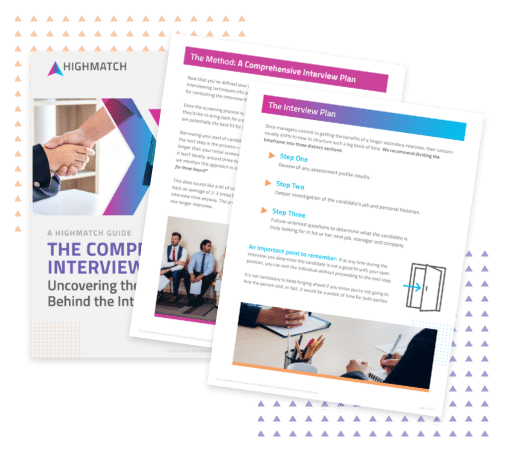HighMatch Guides
What is an interview assessment?
An interview assessment is a structured interview solution that provides your hiring team with the tools to conduct consistent, predictive and objective interviews. An interview assessment can include questions specifically tailored to a specific position, candidate, or desired trait. Additionally, interview assessments produce reports that combine the insights on a candidate from multiple hiring team members.
The following guide will explore the benefits of interview assessments, how they work, their applications, and how they can help limit hiring bias.
Benefits of interview assessments
Interview assessments provide the following key benefits to organizations:
- Improved quality of hires
- Increased interview consistency
- Reduced turnover
- Reduced hiring bias
- Better candidate and culture fit match
How interview assessments work
Interview assessments provide a structured framework of interview questions and guidelines, as well as the tools to meaningfully report the gathered data. An interview assessment should be built by experienced industrial and organizational psychologists and should be specific to the needs of your organization.
The team of psychologists for the assessment company should collaborate with your hiring team to learn their interviewing and hiring challenges as well as the needs of the role. Using this information, the psychologists will create the interview assessment, which your team can then use to ensure all candidates are evaluated based on the same effective criteria.
The reports generated from these interview assessment tools allow hiring managers to quickly review their team’s scores for each candidate and make selections based on those scores.
Use cases for interview assessments
Interview assessments are a great solution for common interview challenges:
- Interview preparation: Preparing to interview a candidate can be a costly, time-intensive, and inconsistent process. Interview assessments greatly reduce the time your team spends on interview preparation, allowing them to focus their efforts elsewhere.
- Inconsistent evaluation criteria: Inconsistent interviews can lead to hiring a poor-fit candidate while passing over a much higher quality candidate. By implementing interview assessments, your organization can normalize its evaluation criteria and get consistent results from the interview process.
- Lack of objective data: Hiring decisions based on incomplete or subjective views of a candidate are less likely to provide the best quality hires for your organization. Interview assessments built by professional I/O psychologists are designed to glean as much relevant and objective information as possible from the candidate. This allows your team to make informed and high-quality hiring decisions.
- Hiring bias and stereotyping: A lack of diversity can lead to homogenous perspectives and biased decision making which reduces the quality of hires. Interview assessments help highlight a candidate’s experiences independently from their background. This leads to interviews that are more predictive and fair.
Common issues with interview questions
Many interviewing challenges can be traced back to the questions asked during an interview. When interview questions are created or pulled from the internet without input from experts, the questions may suffer from:
- Inherent bias
- Irrelevancy
- Insufficient breadth or depth
- Inconsistency
- Lack of clarity
- Lack of objective results
To avoid these issues and save both time and money, recruitment teams should work with an assessment vendor that has in-house expert psychologists who can develop a set of highly-effective, personalized questions.
Hiring bias in the interviewing process
Hiring bias is a major concern that refers to the tendency of a hiring team to favor certain applicants based on personal characteristics unrelated to job performance such as race, gender, or age. Hiring bias causes significant negative consequences for both the applicant and the organization:
- Lack of diversity in the workplace. When recruiters and hiring managers favor candidates similar to themselves or with similar backgrounds to themselves, workplace diversity decreases. Research has shown that diverse teams are more innovative and creative with better problem-solving and decision-making skills.
- Missed opportunities to hire the best candidate. When recruiters and hiring managers are biased towards certain applicants, they may overlook other applicants who are better suited for the job. This can result in a less qualified workforce and negatively impact the organization’s performance. If the organization is competing in a global marketplace, a lack of top talent will harm its ability to compete effectively.
- Legal issues for the organization. Discrimination based on factors such as race, gender, age, or disability is illegal in many countries, including the United States. If a candidate believes that they were not hired due to discrimination, they can file a complaint with a regulatory agency or file a lawsuit against the organization. This can result in negative publicity, legal fees, and potential damages to the organization’s reputation.
Given the risks that hiring bias brings, many organizations turn to specialists in Industrial-Organizational Psychology, often called workplace psychologists, who specialize in developing questions for job applicants that are devoid of bias, face-valid (applicants can “see” how the questions apply to the role), and address the underlying need. The leading assessment vendors include access to their team of workplace psychologists as part of a client engagement.
Summary
The interviewing stage is a critical step in the hiring process that needs to be consistent and objective in order to ensure your organization’s long-term success. Interview assessments help hiring managers consistently and accurately predict which candidates are the best fit for your organization. Additionally, interview assessment reports allow hiring managers to quickly and easily review the full hiring team’s feedback on how well each candidate meets a common set of competencies. Overall, interview assessments help reduce bias in the hiring process and improve the quality of hired candidates.





